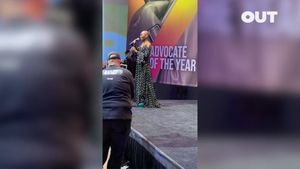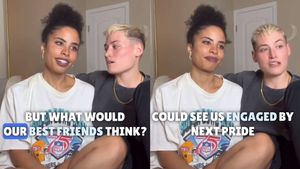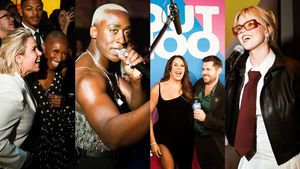More American
women--particularly those in their late teens and
20s--are experimenting with bisexuality or at
least feel more comfortable reporting same-sex
encounters, according to a new report from the Centers
for Disease Control and Prevention. The survey, released
Thursday by the CDC's National Center for Health
Statistics, found that 11.5% of women age 18 to 44
said they've had at least one sexual experience with another
women in their lifetimes, compared with about 4% of women
age 18 to 59 who said the same in a comparable survey
a decade earlier.
For women in
their late teens and 20s, the percentage rose to 14% in the
more recent survey. About 6% of men in their teens and 20s
said they had had at least one same-sex encounter.
While those who conducted the survey took measures to
protect respondents' privacy, researchers say it's
unclear whether the figure for men was lower because they're
more likely to avoid same-sex experiences or whether
they're not reporting them.
It wouldn't
surprise Kat Fowler, a 27-year-old art student who dates
both women and men, if men were less likely to talk
about their experiences. "There's a certain higher
level of discrimination [for men]. It's a lot easier
for women to have these kinds of experiences and be open
about it because it's more accepted," said Fowler, who
attends the University of Florida.
The findings on
bisexuality and other aspects of Americans' sexual habits
were taken from the National Survey of Family Growth, which
included 12,571 in-person interviews, done from March
2002 to March 2003. Overall, researchers said the
report shows that most people have relatively few
partners and are at a low risk for sexually transmitted
diseases. "Instead of just anecdotes and stories that
raise people's anxieties, I think it's best to have
real numbers," said William Mosher, the statistician
who oversaw the report. "And now we have those."
When it comes to
women and same-sex relationships, Mosher said it would
be worth studying why young women seek such relationships
and whether they may be trying to avoid diseases more
commonly spread through sex with men. But some experts
who study sexuality say it's even more likely that
many college students simply see experimentation as a rite
of passage. "It's very safe in the academic community;
no one thinks anything of it," said Elayne Rapping, a
professor of American studies at the University of
Buffalo who has written about sexuality. "But to
some extent there's more talk than action," she added,
noting that the bisexuality label has become a "badge
of courage" for some college women, even those who date
only men. Meanwhile, she said, men who have same-sex
experiences are often less likely to talk about it
publicly.
The trend among
college women has prompted some sexual behavior experts
to coin the term LUG, or "lesbian until
graduation," said Craig Kinsley, a neuroscientist at the
University of Richmond who studies the biology of
sexual orientation and gender.
The survey also
revealed that 39% of men age 15 to 44 who'd had at least
one sexual partner in the last year said they used a condom
during their most recent sexual encounter. That figure
rose to 65% for men who'd never been
married--and 91% for men who'd ever had sexual contact
with another man. Mosher said it was likely that men
in higher-risk categories were heeding campaigns that
encourage them to use condoms. "Whether the levels [of
condom use] are high enough is for others to judge,"
Mosher said. "But I think it's at least encouraging." (AP)


















































































